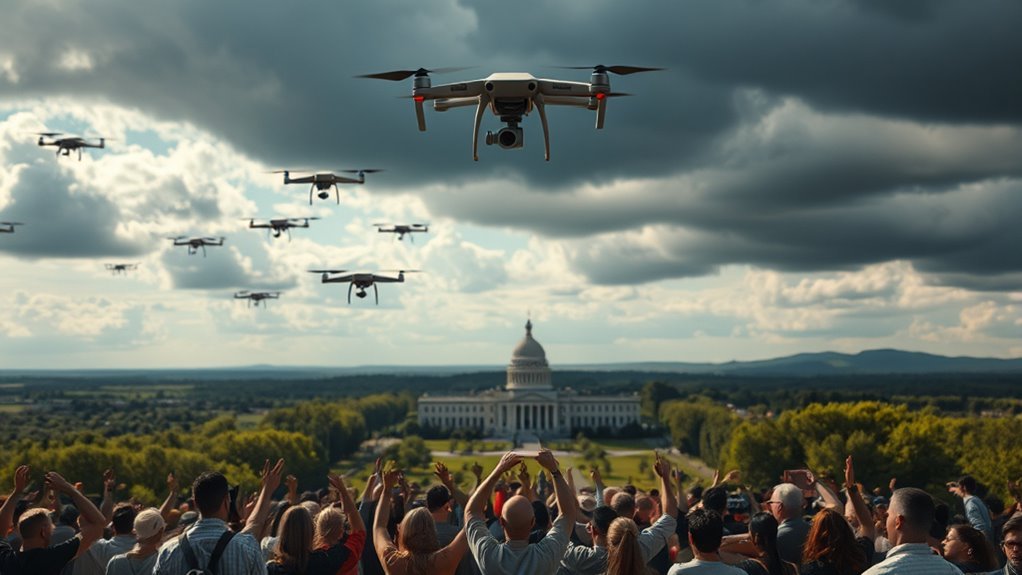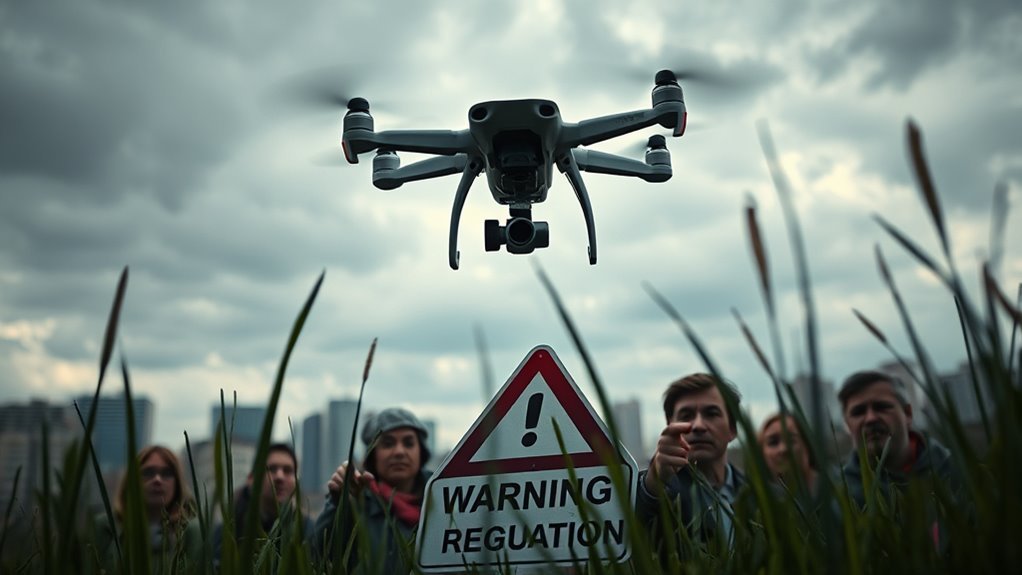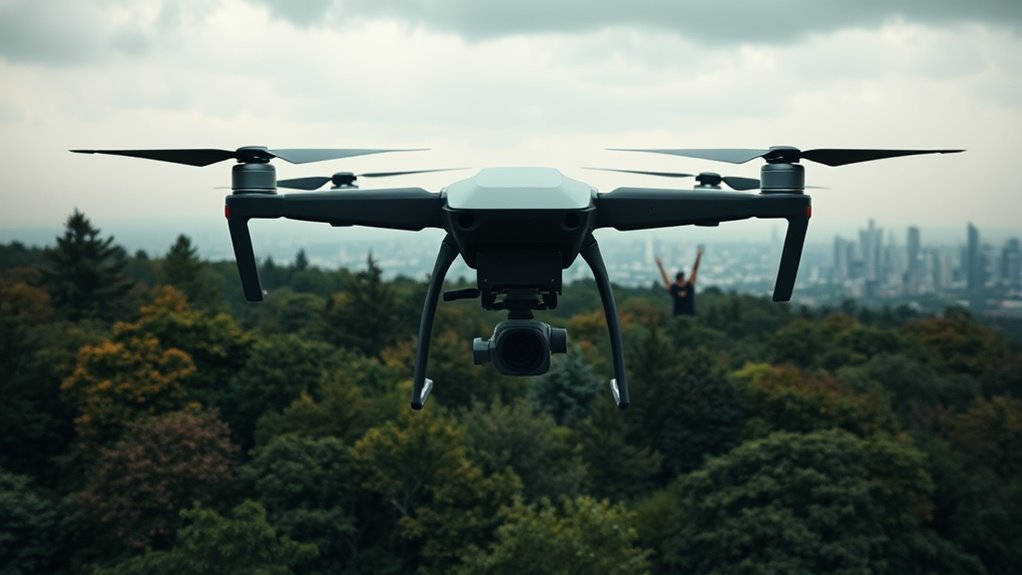DJI drones are facing possible bans due to rising concerns around national security, data privacy, and their foreign ownership. Increased scrutiny emphasizes vulnerabilities related to data transmission and potential exploitation. Compliance with export regulations is critical, as safety risks in urban environments and environmental impacts weigh heavily on regulations. Additionally, growing competition from domestic manufacturers and legislative pressures are intensifying the situation. Understand the broader implications of these challenges and how they may affect drone operations soon.
National Security Concerns

As concerns about national security rise, the use of DJI drones has come under increased scrutiny. These aerial surveillance technologies, while innovative, present potential vulnerabilities that could be exploited in the context of national defense strategies. The integration of such drones into various sectors raises alarms about their potential misuse, especially in sensitive areas where security is paramount. You might consider how foreign ownership and data transmission could compromise national interests, leading to calls for stricter regulations or outright bans. The balance between leveraging advanced aerial capabilities and ensuring robust national security measures is delicate. As you contemplate the implications, it’s essential to weigh the benefits of these technologies against the inherent risks they pose to sovereignty and safety. Additionally, the advanced safety standards incorporated by DJI may not be sufficient to alleviate all concerns regarding their operation in critical areas. Moreover, the employing radar-based systems for collision avoidance in military applications highlights the importance of robust safety protocols in drone operations.
Data Privacy Issues

When you use DJI drones, you’re potentially subject to extensive user data collection, raising concerns about how that data is stored and utilized. This information can be vulnerable to government surveillance, which further complicates the privacy landscape. It’s essential to reflect on the implications of these practices on individual privacy rights and national security.
User Data Collection
While DJI drones are celebrated for their advanced technology and user-friendly features, concerns about user data collection have become increasingly prominent. Users often find themselves questioning how their data is handled, especially regarding user consent and data transparency. Here are some critical points to reflect upon:
- Data collection practices may occur without explicit user consent.
- Users might be unaware of the extent of data shared with third parties.
- Lack of transparency in data usage can lead to potential misuse.
- The absence of robust privacy policies raises alarms about user rights.
For those valuing freedom, these issues underscore the importance of understanding data privacy. As awareness grows, the demand for clearer policies and user control over data will likely increase, potentially impacting DJI’s market position.
Government Surveillance Concerns
Concerns about user data collection naturally extend to the implications of government surveillance. As you consider the capabilities of DJI drones, it’s vital to realize that the data captured could be accessed by governmental entities, raising significant issues around government transparency. The potential for misuse of this data in the name of security erodes trust in ethical surveillance practices. You might wonder how this aligns with your right to privacy. The reliance on drone technology for monitoring can blur the lines of ethical boundaries, leading to an environment where surveillance is normalized without adequate checks. Balancing security needs with individual freedoms is essential to guarantee that technological advancements don’t infringe upon your civil liberties.
Surveillance Capabilities

When considering the surveillance capabilities of DJI drones, it’s important to recognize their potential for invasive monitoring techniques. As these drones become more prevalent, privacy concerns are likely to escalate among the public and regulators alike. Understanding the balance between technological advancement and privacy rights is essential in this discussion.
Invasive Monitoring Techniques
As DJI drones continue to gain popularity, their sophisticated surveillance capabilities raise significant ethical and privacy concerns. These invasive technologies can blur the lines between security and personal freedom, leading to potential misuse. You might want to reflect on the following aspects:
- Real-time video streaming that can capture private moments.
- High-resolution imaging that can penetrate personal spaces.
- Geolocation tracking, revealing individuals’ movements and habits.
- Automated facial recognition, identifying people without consent.
Understanding these monitoring ethics is essential, as the balance between technological advancement and personal privacy becomes increasingly delicate. While DJI drones offer remarkable features, the implications of their surveillance capabilities may lead to stricter regulations and bans to protect individual freedoms.
Privacy Concerns Rising
The rise of DJI drones has sparked a wave of privacy concerns, particularly due to their advanced surveillance capabilities. With features like facial recognition, these drones can easily identify individuals without consent, raising ethical questions about personal privacy. As you navigate public spaces, the presence of such technology could lead to unwarranted monitoring, making you feel less secure in your own surroundings. Furthermore, while DJI claims to use data encryption to protect collected information, doubts remain about the effectiveness of these measures against potential breaches or misuse. The combination of powerful surveillance tools and ambiguous data practices creates an environment where your freedom could be compromised, igniting calls for stricter regulations on drone usage and enhanced privacy protections.
Foreign Ownership and Control
While concerns about national security have intensified, the issue of foreign ownership and control over drone manufacturers like DJI has become increasingly contentious. You might wonder how foreign investments impact this landscape. Key factors to evaluate include:
- Potential risks to national security due to data access
- Ownership regulations that may not align with domestic interests
- Influence on technological advancements and innovation
- Economic implications of reliance on foreign entities
These elements highlight the growing anxiety around foreign ownership, as governments seek to protect their citizens and maintain autonomy in critical technology sectors. As scrutiny continues, the balance between encouraging innovation and ensuring national security becomes more complex, raising questions about the future of drones like DJI in the marketplace.
Compliance With Export Regulations
Given the increasing scrutiny on drone manufacturers, compliance with export regulations has become a critical focus for companies like DJI. As a consumer, you should be aware that DJI faces significant regulatory challenges in various markets. These challenges stem from the need to navigate complex export compliance frameworks designed to safeguard national security. Non-compliance can lead to severe repercussions, such as bans or restrictions, which directly affect your access to their products. Additionally, the evolving nature of these regulations means that DJI must continually adapt its practices to meet legal requirements. As these companies grapple with compliance issues, the potential for disruption in the market landscape increases, impacting your freedom to operate and utilize DJI drones effectively. This includes the necessity for supply chain disruptions that can arise from regulatory changes, which may hinder the availability of DJI products in the future. Moreover, adherence to FAA regulations is crucial for maintaining operational integrity and ensuring the safe integration of drones into shared airspace.
Potential for Malware and Hacking
When using DJI drones, you should be aware of their vulnerable software systems that can be exploited by malicious actors. This raises significant data privacy concerns, as unauthorized access could lead to sensitive information being compromised. Understanding these risks is essential for evaluating the overall security of drone operations. Additionally, integrating advanced AI can enhance security by streamlining operations and minimizing vulnerabilities. Implementing encryption methods can further protect drone footage from unauthorized access and ensure user data remains secure.
Vulnerable Software Systems
As the use of DJI drones becomes increasingly widespread, concerns about their vulnerable software systems have gained prominence, particularly regarding the potential for malware and hacking. These vulnerabilities can create significant risks for users, making it essential to evaluate the implications of such weaknesses. Here are key issues related to software vulnerabilities:
- Inconsistent security patches could leave drones exposed.
- Outdated firmware increases susceptibility to attacks.
- Lack of robust encryption mechanisms can allow unauthorized access.
- User data may be compromised through exploitable weaknesses.
Given these factors, it’s clear that without stringent security measures, the likelihood of malware infiltration and hacking incidents remains high, raising serious questions about the reliability of DJI drones in a free and secure environment.
Data Privacy Concerns
While the allure of DJI drones lies in their advanced capabilities, the potential for data privacy breaches cannot be overlooked. Data collected during flights often includes sensitive information, raising concerns about how this data is stored and shared. Without robust data encryption, your personal information could be vulnerable to malware or hacking attempts. Additionally, the lack of clear user consent protocols can leave you exposed, as users might not fully understand what data is being collected or how it’s used. This ambiguity can foster distrust, as you may feel your freedom is compromised by surveillance. As regulations tighten around privacy, the risks associated with DJI drones could lead to increased scrutiny and potential bans.
Safety Risks in Urban Areas
Although DJI drones offer advanced technology and impressive capabilities, their use in urban areas raises significant safety concerns. Urban drone safety is critical, as densely populated environments increase the potential for accidents. To guarantee effective accident prevention, you should consider the following risks:
- Collision with buildings or infrastructure: High rises and tight spaces can lead to crashes.
- Interference with manned aircraft: Drones may inadvertently enter airspace used by helicopters or planes.
- People’s safety: Drones falling or malfunctioning pose risks to pedestrians. Additionally, reduced GPS reliability in urban areas can further complicate navigation and increase the chances of accidents.
- Emergency situations: Drones can obstruct first responders during critical incidents.
Additionally, the need for strict regulations is underscored by the potential for drones to interfere with manned aircraft, which can lead to severe consequences. Understanding these factors is essential for responsible drone operation in urban settings, highlighting the need for stricter regulations and safety measures.
Environmental Impact and Regulations
The environmental impact of DJI drones cannot be overlooked, especially as their popularity grows. These devices contribute to an increasing ecological footprint, raising concerns about sustainable use. As regulations tighten, understanding these impacts becomes essential for operators like you. Drones that utilize precision planting techniques can help mitigate some of these effects by reducing waste and optimizing resource use.
| Aspect | Impact Level | Environmental Regulations |
|---|---|---|
| Noise Pollution | Moderate | Local noise ordinances |
| Wildlife Disturbance | High | Protected area restrictions |
| Carbon Emissions | Low | Emission reduction targets |
You should be aware that environmental regulations are evolving in response to these challenges. As a drone user, staying informed will help you navigate potential restrictions while minimizing your ecological footprint. Balancing freedom with responsibility is key. Moreover, employing technologies that focus on precise spraying can significantly reduce the environmental impact of agricultural practices.
Competition With Domestic Manufacturers
As environmental concerns push regulators to impose stricter guidelines, competition among drone manufacturers intensifies, particularly between DJI and domestic producers. This shift in competition dynamics creates various market implications that can reshape the industry landscape.
- Domestic manufacturers may capitalize on local regulations, enhancing their appeal.
- Innovation pressure increases, driving advancements in drone technology, such as AI integration that improves operational efficiency.
- Cost advantages for domestic firms could lead to competitive pricing strategies.
- Consumer preferences may shift toward products perceived as compliant with national interests.
- Coretronic’s focus on privacy-focused drones positions them as a significant competitor in this evolving market.
These factors contribute to a rapidly evolving market where DJI’s dominance is challenged. As you navigate this terrain, staying informed about these dynamics will be essential for understanding the future of drone technology and its regulatory environment.
Growing Legislative Pressure
While manufacturers like DJI have dominated the drone market, growing legislative pressure is increasingly shaping operational frameworks. You’ll notice that various countries are adopting stringent drone regulations, driven by concerns over privacy, security, and airspace safety. Legislative trends are leaning toward requiring manufacturers to comply with stricter safety standards and data protection measures. As these regulations evolve, they may restrict your freedom to operate DJI drones, especially in sensitive areas. The push for greater accountability means you might soon face limitations on where and how you can fly. These developments could reshape the landscape, forcing manufacturers like DJI to adapt or risk losing access to lucrative markets. Staying informed on these changes is vital for maintaining operational flexibility. Moreover, the need for NDAA compliance may further influence the operational capabilities of drone manufacturers in the coming years. Additionally, understanding drone registration requirements is essential for navigating the legal landscape effectively.
Frequently Asked Questions
How Do DJI Drones Compare to Other Brands in Terms of Technology?
When comparing DJI drones to other brands, you’ll notice their advanced features often enhance user experience. This integration of technology provides superior stability, camera quality, and flight capabilities, setting them apart in the competitive drone market.
What Are the Alternatives to DJI Drones for Consumers?
When considering alternatives to DJI drones, brands like Autel, Skydio, and Parrot cater to diverse consumer preferences. Each offers unique features and performance, allowing you to find a drone that best suits your specific needs and desires.
Can DJI Drones Be Modified to Bypass Restrictions?
You could technically modify DJI drones to bypass regulations, but it’s risky. Such drone modifications may lead to legal consequences and compromise safety. Always weigh your desire for freedom against potential repercussions in the drone community.
How Do Bans on DJI Affect Drone Enthusiasts and Hobbyists?
Bans on DJI drones tighten drone regulations, limiting your options and stifling creativity. As a result, the hobbyist community faces frustration and uncertainty, affecting your ability to explore, innovate, and enjoy the freedom of flying.
What Steps Can DJI Take to Address These Concerns?
To address concerns, DJI could enhance regulatory compliance and improve consumer transparency. By actively engaging with regulators and providing clear information on data practices, you’d likely regain trust and foster a more supportive environment for enthusiasts.

